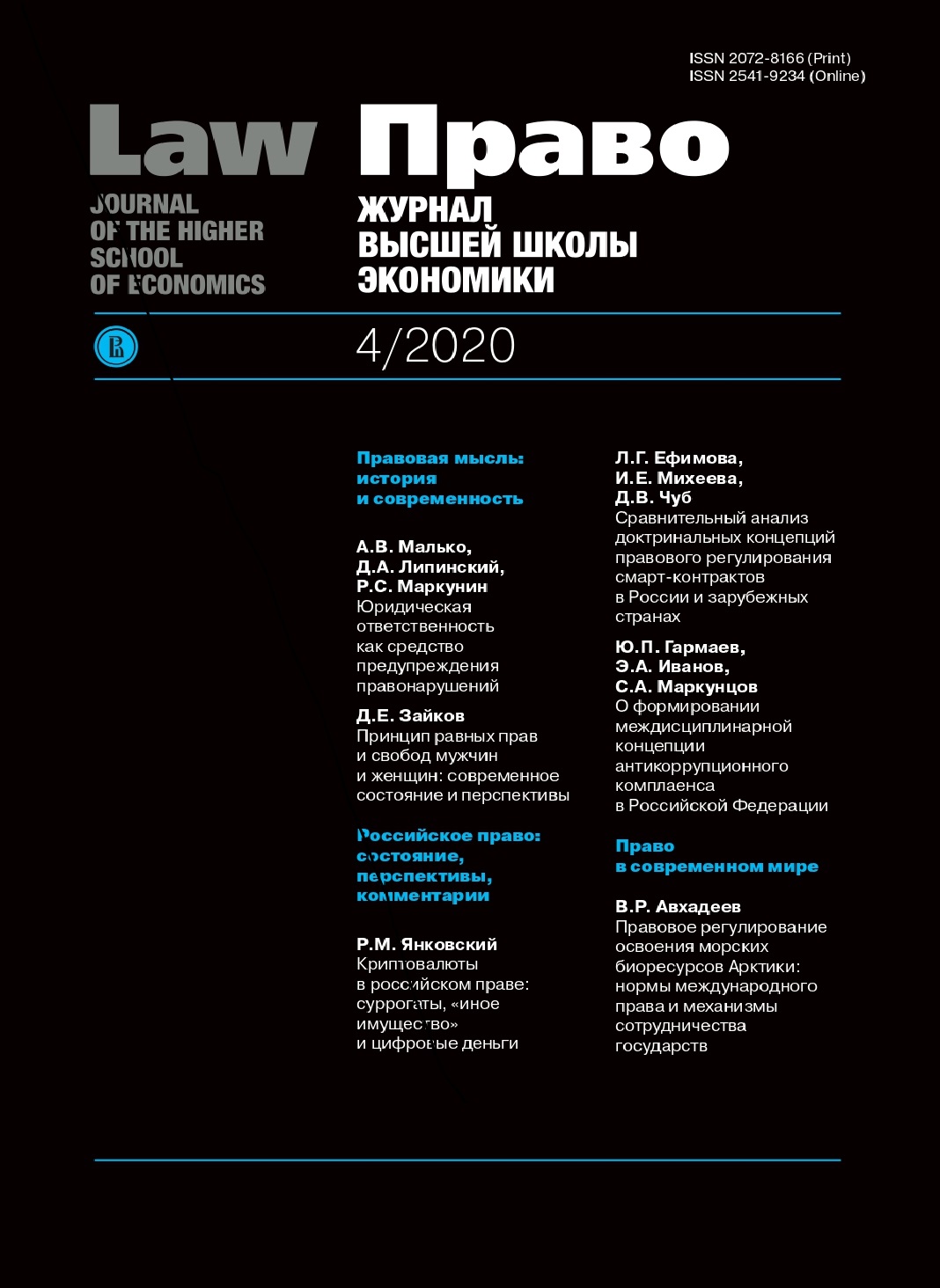Мобильность исследователей как проявление интегрированности правового регулирования в Европе
Аннотация
Авторами изучено правовое регулирование исследовательской мобильности в рамках Европейского исследовательского пространства, созданного в Европейском союзе, и Европейского пространства высшего образования, имеющего более широкий круг государств-участников Болонского процесса. Подчеркивается взаимосвязь правовых политик Евросоюза в научно-технической области, в сфере исследований, образования, а также свободного передвижения работников, и правовой политики в рамках Европейского пространства высшего образования, что придает исследовательской мобильности интегрированный характер. В качестве дополнительного подтверждения интегрированности служит правовое регулирование исследовательской мобильности в ЕС в отношении граждан третьих стран, многие из которых являются членами Европейского пространства высшего образования. Рассматриваются правовые акты ЕС, прямо или косвенно затрагивающие проблему международной мобильности исследователей, а также акты «мягкого права». Прослежено развитие данного направления правового регулирования, рассматривается «лимитированная» совместная компетенция Евросоюза в сфере научных исследований и «передвижения знаний», претендующей на статус «пятой» свободы, а также отмечается незначительная пока роль практики Суда ЕС в области мобильности ученых. Анализируются европейские правовые механизмы, опыт функционирования которых является необходимым подспорьем построения собственной модели обмена учеными, содействующей научному развитию стран Евразийского экономического союза. Авторы приходят к выводу, что опыт правового регулирования исследовательской мобильности в ЕС может быть использован Россией при формулировании предложений в области развития ЕАЭС при условии адаптации этого опыта к условиям евразийской интеграции. Адаптация рассмотренных механизмов также может использоваться в реализации Россией и Евросоюзом Соглашения о сотрудничестве в области науки и технологий 2000 г. Выявлена необходимость разработки в рамках Европейского пространства высшего образования рекомендаций по академической и исследовательской мобильности, использующих опыт правового регулирования мобильности в праве Европейского союза и учитывающих интересы всех государств, участвующих в Болонском процессе, включая Россию.
Литература
Akulshina A.V., Pilieva E.O. (2013) The European Science and Innovation Policy. Sovremennaya Evropa, no 2, pp. 57-74 (in Russian)
Barnard C., Peers S. (2017) The European Union Law. Oxford: OUP, 853 p.
Belov V.A., Kozhayev Y.P. (2017) Legal regulation of labor migration in member states of EU and EAEU. Vestnik MFUA, no 1, pp. 108-120 (in Russian)
Budarina N.A. (2012) International programs of academic and technical cooperation within European Union and Euroasian Economic Community. Vestnik Polotskogo universiteta, no 6, pp. 112-122 (in Russian)
Chetverikov A.O. (2016) Law of the Council of Europe and the Bologna process. Aktual'nye problemy rossijskogo prava, no 2, pp. 79-91 (in Russian)
Chetverikov A.O. (2018) Migration Law of the European Union. Moscow: Prospect, 368 p. (in Russian)
Erokhina K.S. (2008) Social mobility of researchers and its regulation. Sociologicheskie issledovaniya, no 9, pp. 85-93 (in Russian)
Gokhberg L., Polyakova V. (2014) Innovative Activities and Skills. Ithaca (N.Y.): Cornell University Press, 234 p.
Guzzetti L. (1995) A Brief History of European Union Research Policy. Luxembourg: European Communities Press, 252 p.
Ignatushchenko E.I. (2014) The Common European research and technical space and the role of Russia. Moscow: Maks Press, 180 p. (in Russian)
Kozlova E.S., Kuzmin I.A. (2013) International legal regulation of academic mobility as social process at higher education. Vestnik Irkutskogo universiteta, no 9, pp. 261-268 (in Russian)
Nechaeva E.K. (2017) Legal regulation of research and development within regional integration organizations: EU and Eurasian economic union). Candidate of Juridical Sciences Thesis. Moscow, 234 p. (in Russian)
Pascouau Y. (2013) Intra-EU mobility of third-country nationals. State of play and prospects. European Policy Center, Discussion Paper, April, 20 p.
Peers S. et al. (2012) EU Immigration and Asylum Law (text and commentary). Vol. 2. Dordrecht: Martinus Nijhoff, 590 p.
Shelyubskaya N.V. (2013) Formation of research personnel market and internal mobility: EU experience. Moscow: INION, pp. 409-414 (in Russian)
Talagaeva D. A. (2016) Formation of the European scientific space: approaches of the Scandinavian countries. Candidate of Juridical Sciences Thesis. Moscow, 209 p. (in Russian)
Talagaeva D.A. (2017) History of forming European research area: from intergovernmental agreements to EU framework programs. Vestnik Bryanskogo universiteta, no 3, pp. 7686 (in Russian)
Titova T.P. (2015) Development of international academic mobility: experience of the European Union. Sociologiya nauki i tehnologii, no 1, pp. 90-97 (in Russian)
Wiesbrock A. (2010) Legal Migration to the European Union. Dordrecht: Martinus Nijhoff, 809 p.
Copyright (c) 2020 Право. Журнал Высшей школы экономики

Это произведение доступно по лицензии Creative Commons «Attribution-ShareAlike» («Атрибуция — На тех же условиях») 4.0 Всемирная.


















